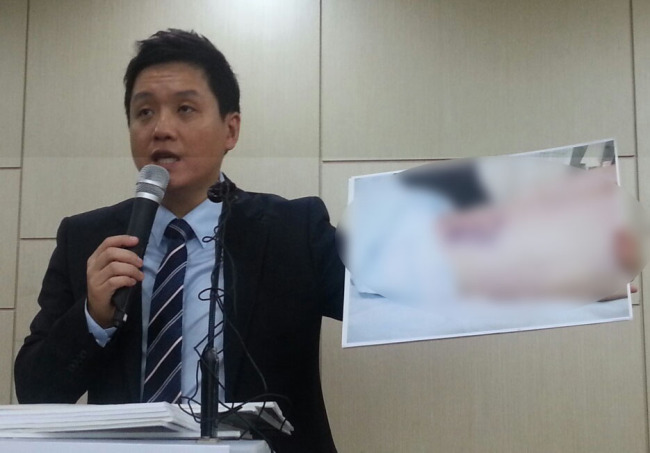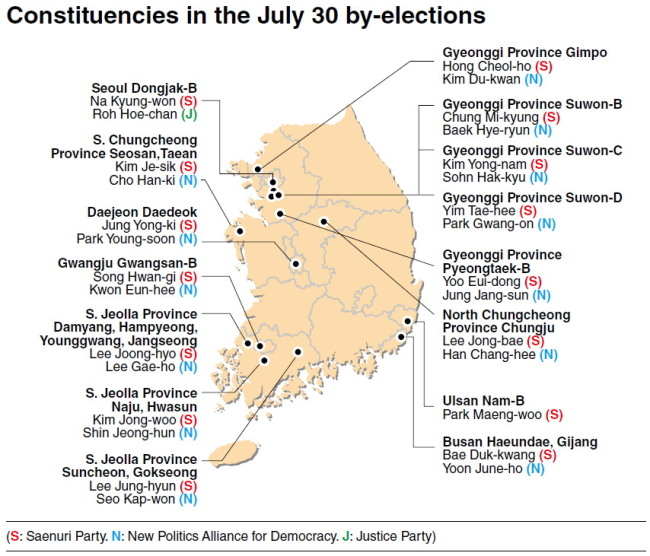Another case of physical abuses at a military barracks is drawing fire from the public, with human rights activists blasting the Army for its continued failure to care for the potential victims of bullying.
It was found this week that a 23-year-old Army private first class, identified by his surname Yoon, died on April 7 after suffering a month of physical and mental violence. Yoon was dispatched to his unit of the Army’s 28th Division in Yeoncheon, Gyeonggi Province, on March 2.
Yoon’s death followed repeated vows by the Army to stamp out violence at barracks and improve the outmoded military culture in the wake of a series of violent incidents, including suicides and even a shooting spree in June by a bullied sergeant.
According to the Center for Military Human Rights Korea, an activist group, Yoon suffered “unspeakable” abuse from his senior colleagues.
Senior soldiers repeatedly beat Yoon at the barracks because they thought he was too slow in responding to their questions and often grimaced, the CMHRK claimed after obtaining part of the military investigation records.
Yoon was also forced to stay awake and stand in the “saddle stance” at night and lick saliva from the floor, according to the center. The senior soldiers also forced him to apply Antiphlamine, an anti-inflammatory ointment, to his genitals ― which the CMHRK argues should be regarded as sexual harassment.
Yoon was initially reported to have died after his senior colleagues struck his chest, blocking his airway and leading to brain damage. Some observers raised suspicions that the Army was trying to downplay or cover up the case by not revealing the tortures Yoon suffered.
Lim Tae-hoon, head of the CMHRK, argued that a murder charge rather than a manslaughter charge should be leveled against the alleged bullies.
“They apparently sought to destroy evidence after the abuses took place. They also said they wished Yoon had died when he lost consciousness. Considering all these (facts), the manslaughter charge should be changed to a murder charge,” he told reporters during a press conference Thursday.
Regarding the sexual harassment claim, the Army said it would see if it had to press additional charges against those involved.
The Defense Ministry apologized to the public for the case and reiterated its resolve to eradicate violence in the military.
“We are deeply sorry about causing concerns. We are also sorry to the bereaved family,” said Wee Yong-sub, chief of the ministry’s Public Information Division. “We are taking this case very seriously and will speed up our efforts to craft measures to improve the military culture and root out all violence and abuse.”
Army chief Gen. Kwon Oh-sung has issued an order to wipe out violence in all units and enhance communication among senior and junior soldiers. The Army has also reprimanded 16 senior officers from Yoon’s unit including the battalion and company commanders.
The prosecution has indicted five others on manslaughter charges and another on assault charges. Prosecutors are seeking sentences of five to 30 years in jail for the alleged bullies.
It was found this week that a 23-year-old Army private first class, identified by his surname Yoon, died on April 7 after suffering a month of physical and mental violence. Yoon was dispatched to his unit of the Army’s 28th Division in Yeoncheon, Gyeonggi Province, on March 2.
 |
| Lim Tae-hoon, head of the Center for Military Human Rights Korea, presents photos of a private first class who died in April after suffering physical and mental abuses at his barracks in a unit of the Army’s 28th Division in Yeoncheon, Gyeonggi Province, during a press conference on Thursday. (Yonhap) |
Yoon’s death followed repeated vows by the Army to stamp out violence at barracks and improve the outmoded military culture in the wake of a series of violent incidents, including suicides and even a shooting spree in June by a bullied sergeant.
According to the Center for Military Human Rights Korea, an activist group, Yoon suffered “unspeakable” abuse from his senior colleagues.
Senior soldiers repeatedly beat Yoon at the barracks because they thought he was too slow in responding to their questions and often grimaced, the CMHRK claimed after obtaining part of the military investigation records.
Yoon was also forced to stay awake and stand in the “saddle stance” at night and lick saliva from the floor, according to the center. The senior soldiers also forced him to apply Antiphlamine, an anti-inflammatory ointment, to his genitals ― which the CMHRK argues should be regarded as sexual harassment.
Yoon was initially reported to have died after his senior colleagues struck his chest, blocking his airway and leading to brain damage. Some observers raised suspicions that the Army was trying to downplay or cover up the case by not revealing the tortures Yoon suffered.
Lim Tae-hoon, head of the CMHRK, argued that a murder charge rather than a manslaughter charge should be leveled against the alleged bullies.
“They apparently sought to destroy evidence after the abuses took place. They also said they wished Yoon had died when he lost consciousness. Considering all these (facts), the manslaughter charge should be changed to a murder charge,” he told reporters during a press conference Thursday.
Regarding the sexual harassment claim, the Army said it would see if it had to press additional charges against those involved.
The Defense Ministry apologized to the public for the case and reiterated its resolve to eradicate violence in the military.
“We are deeply sorry about causing concerns. We are also sorry to the bereaved family,” said Wee Yong-sub, chief of the ministry’s Public Information Division. “We are taking this case very seriously and will speed up our efforts to craft measures to improve the military culture and root out all violence and abuse.”
Army chief Gen. Kwon Oh-sung has issued an order to wipe out violence in all units and enhance communication among senior and junior soldiers. The Army has also reprimanded 16 senior officers from Yoon’s unit including the battalion and company commanders.
The prosecution has indicted five others on manslaughter charges and another on assault charges. Prosecutors are seeking sentences of five to 30 years in jail for the alleged bullies.




